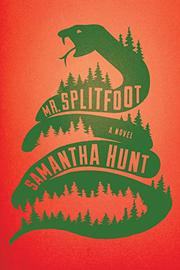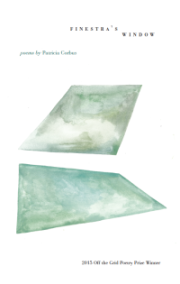 Alum Samantha Hunt’s (fiction, ’99) novel MR. SPLITFOOT was published in January by Houghton Mifflin.
Alum Samantha Hunt’s (fiction, ’99) novel MR. SPLITFOOT was published in January by Houghton Mifflin.
Alum Nan Cuba (fiction, ’89) won the 2016 Jesse H. Jones Memorial Fellowship from the Texas Institute of Letters. She will live for six months on J. Frank Dobie’s 250-acre Paisano ranch outside Austin and receive an $18,000 award.
Alum Beverly Bie Brahic (poetry, ’06) has one poem, “Black Box,” in the current (fall 2015) issue of Field (available in print).
Alum Patricia Corbus’s (poetry, ’96) collection of poems Finestra’s Window has been published  by Off the Grid Press. Finestra’s Window is the 2015 prize winner of this press’s nationwide contest.
by Off the Grid Press. Finestra’s Window is the 2015 prize winner of this press’s nationwide contest.
Finestra’s Window begins with the line, “Open the sky-box, Uncle,” and the poems which follow refuse to sit still. In Tony Hoagland’s words, “Finestra’s Window is a collection full of mortal daring and formal bravado. Corbus’s work amazes and delights me, as it will any reader of poetry.”
Finestra’s Window can be purchased online at: http://offthegridpress.net/.
Alum Bob Oldshue (fiction, ’05) won the 2016 Iowa Short Fiction Award for his short story collection titled November Storm. Judge Bennett Sims says: “Robert Oldshue writes stories that are as rich and self-complicating as novels. Set mostly in Boston, November Storm explores that city—like Stuart Dybek’s Chicago or Edward P. Jones’s D.C.—through the layers of its characters’ memories. Whether he’s writing from the point of view of a haunted psychiatrist, a gay prostitute weathering the AIDS epidemic, or a night watchman at a cemetery, Oldshue proceeds by patiently excavating the past from every place, unearthing a character’s associations and experiences—often in long, spiraling, masterful sentences—until what feels like an entire life has been disclosed. Here a twenty-page story seems deeper—more densely sedimented with consciousness and retrospection—than most two-hundred-page books. This is a sensitive and accomplished collection.”
Alum Diana Lambert’s (fiction, ’01) short story, “That Your Reality Is The Only Reality,” was the third place winner in Glimmer Train’s September 2015 Family Matters Contest.
Alum Elisabeth Hamilton (fiction, ’13) has a short story, “Grown-up Behaviors” published in the Winter 2015 issue of The Cincinnati Review (available in print).




